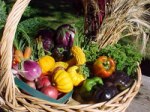The following article was recently published in EPIC magazine in the Albuquerque, Taos and Santa Fe edition. http://www.epicmag.org
Since 1980, the number of Americans considered either overweight or obese has risen to over 68% of the population. Just by being in public, it is startlingly clear how prevalent it is to be heavy. This is not a judgment; it is merely an observation. I do not believe we should all strive to be thin simply because the media portrays it as the key to happiness and success. It is not about looks, it is about health, vitality and longevity. It is not about our outward appearance, but about our inner-happiness. And it is about setting an example for the world.
There are myriad reasons why people eat in unhealthy ways. It can be caused by something psychological (compulsively eating or not eating) or physiological (food addictions). It can be due to monetary circumstances or based on a need for convenience. We may believe that eating healthier food is too expensive or we may be busy and overworked. Maybe we are frustrated with our lives and we are using food for its nurturing and comforting effects. What we are not doing is taking into consideration the correlation between what we nourish ourselves with, and our decreasing quality of life and health.
The impetus for our trend toward obesity was when the U.S. government began to subsidize the food industry in the 1930’s after the Great Depression. The original intention was to control food output and even pay farmers to allow fields to lie fallow during peak growing years. Then in the 1970’s, policies were redirected to overproduce all the time to keep food cheap and to open up markets overseas.
This overproduction kept commodity crop prices low while simultaneously increasing calories produced per person, per day (3200 calories in 1980 to 3900 calories now). Since 1980, the cost of fresh fruits and vegetables has increased over 40% while the cost of beer, butter and soda has actually fallen between 15% and 33%. This set up a perfect storm: an era of cheap and plentiful food for the consumer.
Caloric intake per person went up, as the busy American lifestyle became the norm. Food companies began working in their labs to develop all sorts of “foods” which could be stored for long periods and cook quickly and easily. These tasty and convenient “foods” encouraged loyal, repeat customers and created a way to utilize this never-ending supply of heavily subsidized, cheap food (corn, wheat and soy, for the most part). Fast food restaurants popped up everywhere offering cheap food to eat on the go. Then portion sizes began increasing. We went from drinking a 12-ounce can of soda with 140 calories and 38 grams of sugar, to a 64-ounce big gulp of soda with 780 calories and 217 grams of sugar! That is over 50 teaspoons of sugar. We are super-sizing ourselves to death.
Diabetes, heart disease, hypertension, osteoporosis, cancer and high cholesterol are all caused by poor diet. The cost to American taxpayers of diet-related, chronic diseases runs in the hundreds of billions of dollars per year. In 2006, 84% of the money spent on healthcare was for the 50% of the patients who had chronic illness related to the food they eat! This is unsustainable and a huge burden on our economy, our vitality and our happiness.
The solution of course begins with knowledge and awareness. We can no longer make excuses. We must collectively face the reality that food is a business. It is all about having more sales and making a bigger profit. But as consumers, we play a part as well. Manufacturers like to state, “We make what people want to buy.” If we stop buying a product, it will either no longer be produced, or it will be changed significantly enough to entice us to buy it again.
We must consciously decide to be mindful of what we eat. We must relearn how to cook and take back our culinary integrity. Meals should no longer be out of a box and the vegetables we eat cannot be mostly fried potatoes and pizza sauce. We must choose our foods thoughtfully, with quality and variety in mind. We must become cognizant of portion sizes. We must become aware of where our food comes from and how it was grown. The time is now.
The effect of changing the way we eat doesn’t stop with attaining better health, spending less money on healthcare and becoming a much happier populace. It is actually much more profound.
Choosing to eat more organic, whole foods and sustainably raised animals would have an immediate effect on our ecology. Too many chemicals are used in our heavily industrialized agricultural systems. Petroleum is used to produce chemicals, apply them and then move products to market. Herbicides, fungicides, insecticides, genetically modified crops and nitrogen fertilizer are poisoning us, as well as our land and water. In order to grow plants organically, we must rebuild the soil. This would help to reduce greenhouse gas emissions by sequestering carbon back into the soil from the atmosphere, ultimately slowing down the rate of global climate change.
Animals are being factory-farmed. They are treated only as products to be brought to market, much like making an electric fan. Again, it is about sales and profits. It is the way our current economic system operates. Cows in particular are being fed federally subsidized grains in large feedlots to fatten them quickly before they are slaughtered. Unfortunately for the cows, they were meant only to eat grasses. Grains irritate their digestive system, which causes them to have gas. This bovine produced methane release accounts for about 18% of global greenhouse gas emissions, more than our transportation sector. Additionally, this stress on the cattle is happening immediately before we are about to eat them!
Improving our personal health is a clear and moral choice. We must move from believing we are somehow separate and superior to nature and accept that we are all operating within the same system and we have the power to affect it in big ways. Really, we have come across a win-win-win-win situation and those don’t come along very often. We will get healthy by choosing to eat only whole, sustainably grown foods and by being physically active. The environment will get a boost when we begin to farm without chemicals, rebuild our soils and begin to treat our animals humanely. The ecological health of our planet also benefits if we grow some of our own food at home and seek out foods that are locally and regionally produced. Global climate change is slowed by reduced emissions and carbon sequestration. And ultimately, our economy strengthens because we are not spending so much on healthcare and our productivity increases because we simply feel better. Win. Win. Win. Win.
It is the butterfly effect. When we see and accept the need for conscious eating, we create ripple effects. When we respect ourselves, we begin to respect our food, our neighbor, our community and our planet. You and I have the power to create great change by taking just one action. Are you in?
Scott Ricci is the beneficiary of a long search for truth, meaning and vibrant health in his life. His interests include organic gardening, permaculture, spirituality, cooking and building stuff. He only recently found his true calling and has become a Holistic Health Coach and Garden Guide. Visit http://www.scott-ricci.healthcoach.integrativenutrition.com. Contact him at 505.353.1719 or scottricci@hotmail.com.








